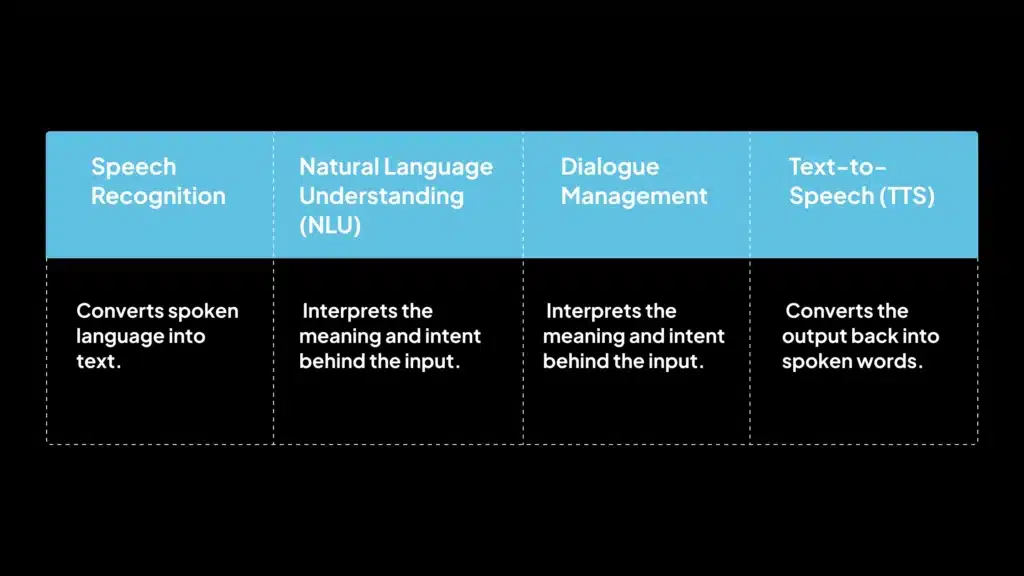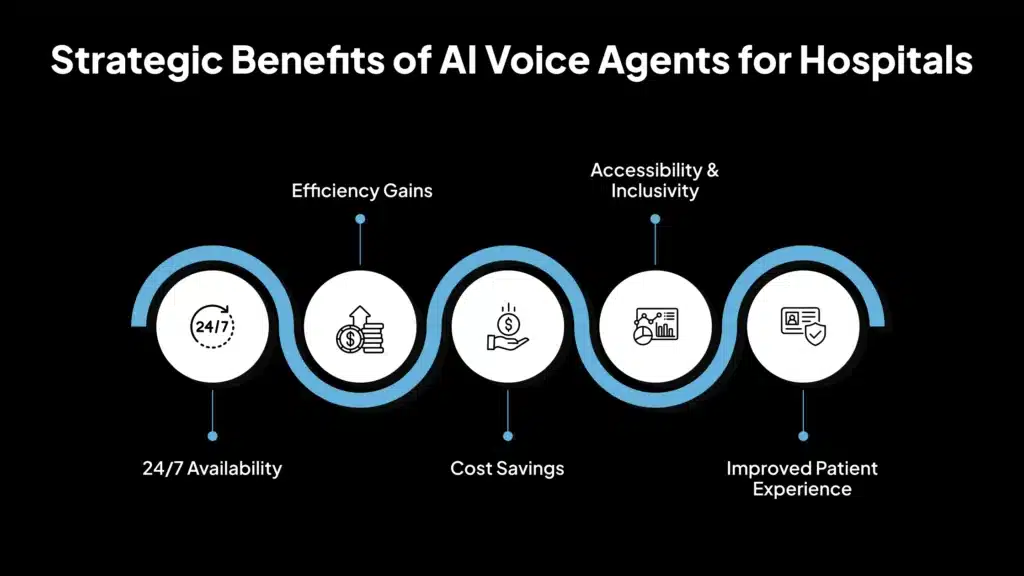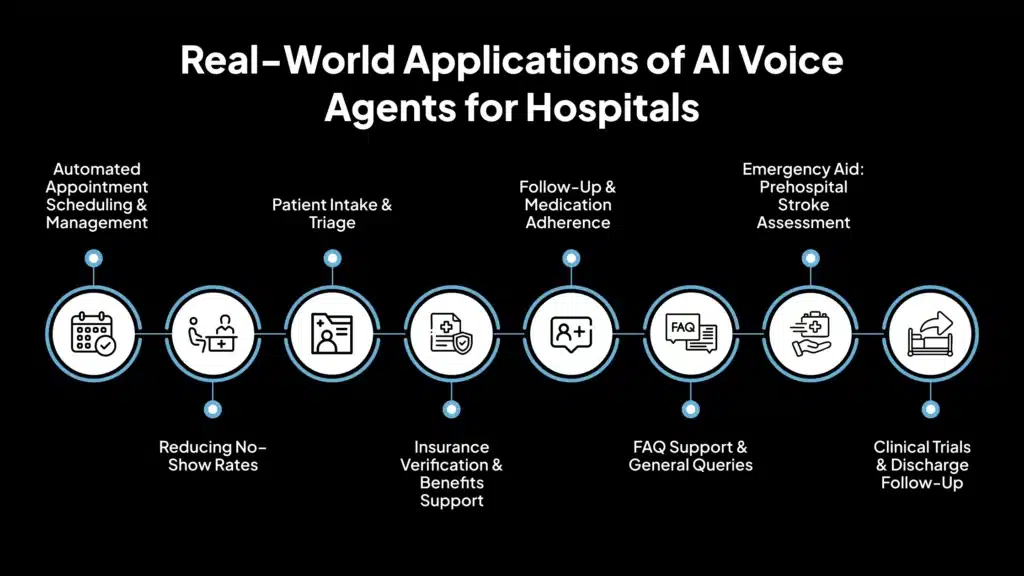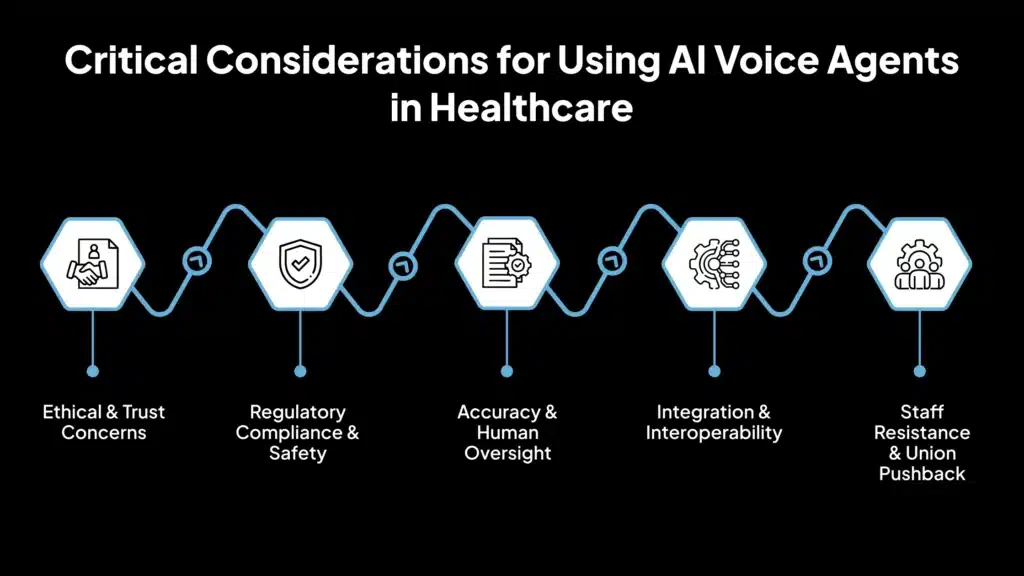Hospitals worldwide are facing a dual crisis: rising patient demand and a shortage of both clinical and administrative staff. In this high-pressure environment, AI voice agents are quickly emerging as a practical and scalable solution, automating tasks, improving response times, and supporting overburdened teams with round-the-clock reliability.
Research indicates that primary care physicians allocate 40% of their time to patient-facing activities and 60% to non-patient-facing tasks, including paperwork, messaging, and insurance-related tasks, reflecting a significant administrative burden. Meanwhile, the World Health Organization (WHO) estimates a projected shortage of 10 million health workers globally by 2030. These numbers present the pressing need for tools that reduce non-clinical workload and enhance access to care without increasing pressure on human teams.
Hospitals are beginning to see measurable improvements in operational efficiency, patient engagement, and service delivery through the use of AI voice systems. These technologies are not part of a distant future; they are actively transforming how healthcare organizations manage communication and administrative workflows today.
This blog examines why healthcare systems are embracing AI-powered voice agents, how they operate, where they’re making a difference, and the challenges hospitals must consider before implementing them.
What Are AI Voice Agents in Hospitals?
AI voice agents in hospitals are advanced software programs that utilize Artificial Intelligence (AI) and Natural Language Processing (NLP) technologies. They are designed to understand, process, and respond to human speech in a way that mimics a natural conversation.
These systems are capable of performing a variety of routine and administrative healthcare tasks, such as scheduling appointments, answering patient queries, conducting pre-screening or triage, collecting patient information, assisting with clinical documentation, following up on post-discharge instructions, and routing calls to the appropriate department. AI voice agents work 24/7 and can handle thousands of conversations simultaneously without fatigue or delays.
These voice agents use a combination of:

For example, if a patient says, “I want to book an appointment with a cardiologist next Tuesday,” the system can:
- Identify the specialty (“cardiologist”)
- Recognize the date (“next Tuesday”)
- Check availability in the hospital’s scheduling system.
- Book the slot and confirm with the patient, all without human intervention.
Difference Between AI Voice Agents and Regular IVR Systems
Below is a detailed comparison highlighting how AI voice agents differ from regular IVR systems in terms of technology, user interaction, and overall capabilities.
| Feature | AI Voice Agents | Regular IVR Systems |
| Technology Used | AI, NLP, Machine Learning | Pre-programmed logic and keypad inputs |
| User Interaction | Natural, conversation-like speech | Menu-driven (“Press 1 for…”) |
| Understanding Context | Can understand intent, context, and follow-up questions | Cannot process meaning beyond specific prompts |
| Personalization | Dynamic responses tailored to user profiles and history | Static scripts with no contextual awareness |
| Learning Capability | Improves over time through feedback and data | No learning or adaptation |
| Handling Complex Tasks | Can handle multi-step processes like triage or documentation | Limited to basic routing or information sharing |
Essential Factors Making AI Voice Agents Essential in Healthcare
As hospitals face increasing operational challenges, AI voice agents are being adopted as a practical solution to reduce strain, lower costs, and improve overall efficiency. Below are the three primary drivers behind this shift.
1. Operational Pressures
Hospitals are experiencing a growing mismatch between the number of patient interactions and the staff available to handle them. Many healthcare facilities receive thousands of calls daily, ranging from appointment bookings and prescription refills to inquiries about lab results. Regular phone systems and manual handling struggle to keep up, especially during peak hours.
Staffing has not increased in proportion to patient demand. In some cases, healthcare systems face staff shortages due to burnout, budget constraints, or high turnover rates. This leads to extended call wait times, missed follow-ups, and delays in service delivery.
Non-clinical administrative tasks consume a significant portion of staff time, reducing their ability to focus on higher-value or patient-facing activities. AI voice agents help alleviate this pressure by automating repetitive queries and tasks.
2. Cost Constraints
Hospitals are under pressure to optimize resources and cut operational expenses without compromising patient care quality. Employing full-time staff to handle administrative tasks such as appointment confirmations, insurance verifications, or documentation follow-ups is costly. AI voice agents can perform the equivalent workload of dozens of employees at a fraction of the cost.
Unlike human staff, AI systems can scale rapidly during high-demand periods, such as flu season or COVID-19 surges, without incurring overtime or additional hiring costs. This helps hospitals manage fluctuating volumes without compromising efficiency.
Automating high-volume tasks reduces the likelihood of manual errors and call drops, thereby indirectly saving costs associated with rework, patient dissatisfaction, and missed care opportunities.
3. Clinician Burnout & Documentation Burden
Administrative overload is one of the top contributors to clinician burnout, affecting both the quality of care and the retention of providers.
Doctors and nurses often spend hours daily documenting patient encounters, updating electronic health records (EHRs), and completing compliance forms. This administrative workload limits the time available for direct patient interaction. When providers spend more time typing than treating, it leads to dissatisfaction, mental fatigue, and burnout. This affects both the clinician’s health and the quality of care delivered.
AI-powered medical scribes can listen to consultations in real-time, extract key clinical data, and auto-populate patient records. Studies have shown this can reduce documentation time by up to 70%, giving clinicians more time to focus on patients and improve engagement.
Strategic Benefits of AI Voice Agents for Hospitals

AI-driven voice assistants support more efficient and patient-friendly healthcare by automating routine tasks, enabling staff to focus on critical care activities. Here is a breakdown of the essential benefits hospitals can gain from adopting AI voice agents:
1. 24/7 Availability
Even outside regular hours, AI voice agents remain active, handling inquiries, scheduling, and call routing without human staffing gaps. This ensures continuous service availability, reducing patient wait times for simple tasks and improving overall access to care.
2. Efficiency Gains
AI voice agents streamline workflows by automating administrative tasks. For instance, the NHS’s adoption of ambient voice technologies has already begun to reduce documentation burdens and wait times in hospitals and GP settings.
3. Cost Savings
Automating high-volume call and documentation tasks helps hospitals reduce labor costs while maintaining service throughput. According to a recent study, a hospital network estimates annual gains of $55–72 million by adopting predictive tools for patient outcomes.
4. Accessibility & Inclusivity
Voice interfaces make healthcare interactions easier for those with low digital literacy, visual impairments, or mobility limitations. These technologies support broader inclusivity by offering an intuitive alternative to screen-based systems, a feature underscored by public sector AI use guidelines, which emphasize AI’s role in improving productivity and access to services in public settings.
5. Improved Patient Experience
AI voice agents deliver natural, contextually sensitive conversations, enhancing clarity, responsiveness, and overall satisfaction.
For example, a large-scale trial of a physician-supervised conversational agent found that patients rated the clarity of information higher (3.73 vs. 3.62 out of 4) and overall satisfaction improved (4.58 vs. 4.42 out of 5) compared with standard care.
Real-World Applications of AI Voice Agents for Hospitals

Below are real-world applications that showcase how AI voice agents enhance hospital operations.
1. Automated Appointment Scheduling & Management
Hospitals utilize AI agents to manage booking, rescheduling, cancellations, and reminders continuously.
For example, Northwell Health implemented a voice-enabled assistant, achieving a 25% increase in appointments and a 30% reduction in call center volume. Cedars‑Sinai Medical Center, in Los Angeles, implemented a voice‑enabled chatbot to manage appointment-related inquiries. The rollout led to a 50% reduction in call center volume, and user satisfaction reached 94%.
2. Reducing No–Show Rates
AI voice agents reach out to patients with reminders and pre-visit instructions, offering easy rescheduling options. An orthopedic clinic that deployed this technology achieved a notable drop in no-show rates within three months, highlighting the effectiveness of proactive voice engagement.
3. Patient Intake & Triage
Some AI systems support intake by collecting medical history, identifying urgency, and routing patients correctly. One AI voice solution can pre-qualify patients via customized questions, segment urgency, log data into EHR, and expedite scheduling, facilitating smoother and faster triage.
Many U.S. healthcare providers deploying AI voice agents for appointment reminders and routine call handling report substantial reductions in missed visits and improved scheduling efficiency, contributing to better patient engagement and smoother operations.
4. Insurance Verification & Benefits Support
AI voice agents can automatically verify coverage, manage prior authorizations, and clearly explain benefits to patients. They interact in real-time with insurance systems and escalate issues when needed, reducing delays, streamlining billing, and freeing staff for more complex tasks.
5. Follow-Up & Medication Adherence
Voice agents help patients adhere to treatments by sending personalized reminders, monitoring post-care recovery, and identifying red flags. They remind patients about their medication, monitor side effects, and escalate concerns when necessary, boosting treatment adherence and reducing readmission rates.
6. FAQ Support & General Queries
Not every call needs a human touch. Many patients seek basic information, such as clinic hours, test preparation, or medication refills. AI voice agents efficiently and accurately field these queries, reducing the load on staff while maintaining consistent and reliable service.
7. Emergency Aid: Prehospital Stroke Assessment
Voice-based agents are being tested in emergency care to guide non-medical individuals through stroke evaluations. Evidence from Mayo Clinic researchers suggests that AI and telemedicine, such as stroke-aware mobile units and telemedicine-enabled ambulances, have the potential to significantly improve prehospital stroke triage and diagnostic accuracy.
8. Clinical Trials & Discharge Follow-Up
AI agents are deployed to recruit and support clinical trial participants, handling prescreening outreach and coordination. They also automate post-discharge follow-up calls to ensure continuity of care and reduce the likelihood of readmissions. These tools help lighten the load for clinicians while maintaining patient engagement and satisfaction.
Critical Considerations for Using AI Voice Agents in Healthcare

AI voice agents offer compelling benefits for hospitals, but their adoption introduces essential challenges. The following points highlight the primary considerations and risks in implementing AI voice agents in healthcare.
1. Ethical & Trust Concerns
AI voice agents raise significant ethical concerns, particularly regarding privacy, consent, and the use of data. AI voice devices can record or process conversations without explicit user consent, eroding trust and privacy boundaries. This “always-on” mode is particularly sensitive in healthcare settings, where patient confidentiality is of the utmost importance.
Voice data may include personal or identifiable information. Unlike passwords, voiceprints cannot easily be changed if compromised. This unique characteristic can make voice AI systems attractive targets for deception or identity misuse.
2. Regulatory Compliance & Safety
Hospitals must meet strict privacy and security standards when deploying AI agents, especially in handling protected health information. AI voice systems in healthcare must comply with relevant regulations, such as HIPAA (U.S.), SOC 2, PCI, and ISO 27001, to protect patient data and ensure the reliability of the system.
These tools must employ secure data handling protocols, including encryption, access controls, and audit capabilities, to ensure the protection of sensitive data. Failure to do so risks compliance violations and patient harm.
3. Accuracy & Human Oversight
While AI aides bring efficiency, they cannot eliminate the need for human judgment. AI systems, such as AI “nurses”, can generate false alarms or follow standard protocols that may be inappropriate in specific clinical contexts. For example, rigid automated recommendations have led to potential over-treatment or unsafe actions unless overruled by human clinicians.
Nurses and clinicians urge sustained oversight, warning that over-reliance on AI may erode clinical skills and safe decision-making.
4. Integration & Interoperability
Exchanging data seamlessly between AI voice systems and existing infrastructure is essential, but it is often a challenging task. AI voice tools must integrate smoothly with EHR, telephony, and CRM systems, many of which use legacy architectures. Poor integration can disrupt workflows or hamper care quality.
Without proper data standards (like FHIR or secure APIs), critical patient information may remain siloed, limiting the effectiveness of AI analytics and decision support.
5. Staff Resistance & Union Pushback
AI adoption often triggers concerns among staff about job security and loss of autonomy. Many healthcare workers worry that AI will diminish their roles or replace them entirely. Unions, like the National Nurses United, have actively voiced concerns, calling for safeguards to protect human oversight. Broader labor sentiment reflects concern about job displacement and demands greater worker involvement in the implementation of AI.
Why Healthcare Organizations Should Choose Avahi AI Voice Agents?
Managing patient communication efficiently is critical for healthcare providers. Avahi AI Voice Agents provide a dependable and scalable solution designed to handle the high volume and complexity of routine patient calls, freeing up clinical teams to focus on delivering care.
1. Designed Specifically for Healthcare Needs
Avahi’s AI voice agents are built with healthcare workflows in mind. From appointment scheduling to handling insurance queries, the system is trained to manage the various types of interactions that occur daily in medical, dental, specialty, and urgent care settings.
2. Real-Time Call Management and Scheduling
The system can book, reschedule, or cancel appointments instantly, reducing administrative overhead and ensuring patients receive timely assistance without waiting on hold.
3. Reduces No-Shows with Automated Follow-Ups
By sending out reminders and follow-up messages, the AI agent helps reduce missed appointments, improving patient attendance and maintaining a consistent schedule for providers.
4. Prioritizes Urgent Cases
The voice agent identifies and escalates urgent issues directly to human staff, ensuring that critical patient needs are not delayed or overlooked.
5. Alleviates Staff Workload and Strain
By automating repetitive and time-consuming tasks, such as answering routine questions and verifying referrals, Avahi reduces the burden on front-desk teams, allowing them to focus on higher-priority tasks.
6. Supports High-Demand Care Environments
Whether it’s a busy dental office, behavioral health clinic, or urgent care center, Avahi adapts to fast-paced environments where timely and accurate communication is essential.
Avahi AI Healthcare Voice Agents are strategic enablers that help healthcare providers deliver better patient experiences while managing operations more efficiently.
Discover Avahi’s AI Platform in Action
At Avahi, we empower businesses to deploy advanced Generative AI that streamlines operations, enhances decision-making, and accelerates innovation—all with zero complexity.
As your trusted AWS Cloud Consulting Partner, we empower organizations to harness the full potential of AI while ensuring security, scalability, and compliance with industry-leading cloud solutions.
Our AI Solutions Include
- AI Adoption & Integration – Utilize Amazon Bedrock and GenAI to Enhance Automation and Decision-Making.
- Custom AI Development – Build intelligent applications tailored to your business needs.
- AI Model Optimization – Seamlessly switch between AI models with automated cost, accuracy, and performance comparisons.
- AI Automation – Automate repetitive tasks and free up time for strategic growth.
- Advanced Security & AI Governance – Ensure compliance, detect fraud, and deploy secure models.
Want to unlock the power of AI with enterprise-grade security and efficiency? Start Your AI Transformation with Avahi Today!
Frequently Asked Questions
1. What are AI voice agents for hospitals?
AI voice agents for hospitals are intelligent, speech-enabled systems that use artificial intelligence and natural language processing (NLP) to automate patient communication. They handle tasks such as appointment scheduling, answering FAQs, triage, follow-ups, and routing calls to the appropriate departments, thereby reducing the workload on hospital staff.
2. How do AI voice agents improve hospital efficiency?
AI voice agents enhance hospital efficiency by automating high-volume administrative tasks, including call handling, appointment booking, and documentation. This leads to shorter wait times, reduced manual errors, and more effective allocation of staff resources, all of which contribute to faster and more reliable patient service.
3. Are AI voice agents HIPAA-compliant for use in hospitals?
Yes, reputable AI voice agents for hospitals are designed to comply with HIPAA and other regulatory standards, such as SOC 2 and ISO 27001. This ensures secure handling of patient data and privacy during all voice interactions within clinical workflows.
4. Can AI voice agents for hospitals handle emergency or urgent calls?
AI voice agents can be trained to identify keywords and tone that signal urgency and route such calls to human staff or emergency services in real-time. While not a replacement for clinical judgment, they support faster triage and escalation when integrated correctly.
5. Are AI voice agents suitable for small clinics or just large hospitals?
AI voice agents are scalable and adaptable, making them ideal for both small clinics and large hospitals. Dental practices, urgent care centers, behavioral health clinics, and specialty care providers can all benefit from automated call handling and reduced admin load.




